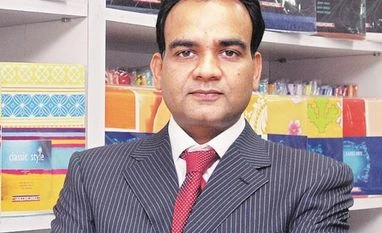Associated Chambers of Commerce and Industry of India (Assocham) President BAL KRISHNA GOENKA tells Subhayan Chakraborty that a stress fund should be created to leverage stalled projects in the housing
sector. Edited excerpts:
What should be the main way to deal with the current slowdown in demand? First, the government has to start borrowing from the market at a lower interest rate. While the Reserve Bank of India (RBI) has reduced the repo rate, banks have not cut their lending rates. They are not reducing it because of the input cost-output cost difference.
The input cost is fixed deposits. If the government is borrowing at 6.8-7 per cent, how can banks reduce the rate? Once, the government rates go down, the fixed deposit rates will also dip.
Do you think muted growth of corporate earnings in the first quarter of this financial year (2019-20) is an indication of the slowdown extending?
Corporate earnings so far have been a mixed bag. There is stress in some sectors such as automobiles and finance (especially non-banking financial companies or NBFCs). In manufacturing as well, capacity utilisation must pick up from 76 per cent to create room for private sector capex.
Some service industries such as information technology have shown better results on better adaptation to emerging technologies such as artificial intelligence and automation.
What about the real estate sector? Do you feel the effect of the Supreme Court judgment on Amrapali would complicate matters?
Homebuyers are a very important segment of the society and contribute to economic growth. I am sure things will fall in place and the stalled housing projects will be completed.
The government can look at Assocham’s suggestion of creating a “stress fund”, which can be leveraged for stalled projects. The Ministry of Housing and Urban Affairs, the Ministry of Corporate Affairs, and the NITI Aayog are working on some solutions with governments of Uttar Pradesh, Maharashtra and Haryana.
This sector is in the midst of structural changes with the Real Estate (Regulation and Development) Act, 2016; the Insolvency and Bankruptcy Code; and other regulatory measures. Housing finance companies and NBFCs are also going through structural changes.
Companies with a financially sound base and delivering units as committed would retain their reputation. The sector is driven by customer-centricity and demand. It is an important sector of the economy and must be supported, as it is responsible for large-scale job creation.
Is it time we stop waiting for an investment revival in the manufacturing sector?
The government’s push is to bring about a fundamental change. The ultimate robustness in the economy would be driven because of fundamental changes only. These things take time. For example, the benefits of the goods and services tax on the industrial side will start kicking in from this year.
Despite a lot of policy intervention, textile exports continue to fare poorly. What more can be done?
A lot of things have been done by the government over the past three years. The refund of state levies have been done away with, fixed-term employment has been introduced, and import duties have risen.
Right now, there’s no demand in the market. Lack of liquidity is also an issue.
Also, competition from China remains a big worry. They are dumping products across the globe. Their economy is going through its own problems, so they have raised production, while their capacity remains huge.
Also, we don’t have free-trade agreements (FTAs). On the other hand, Pakistan and Vietnam get zero-duty import access, benefiting from their underdeveloped nation status.
On the matter of FTAs, should we go forward on the Regional Comprehensive Economic Partnership (RCEP) deal?
The government is positive on the deal. China remains the only problem.
The question is how well we negotiate with China, because India should not be a dumping ground. So, we are fighting. It is true that China is vacating the space of the lower-end, labour-intensive manufacturing.
We cannot afford to be out of the RCEP because other important economies —Australia, Japan and South Korea — are part of it.
Do you think increase in taxes on foreign institutional investors (FIIs) and high-income individuals may lead to tax dodging or loss of investment?
With Parliament passing the Budget, it is a reality which must be adjusted to. More FIIs may convert themselves into a corporate structure from their existing ownership structure of association of persons (AoPs).
Is the plan to ban all two-wheelers below 150cc and three-wheelers with an internal combustion engine from 2025 and 2023, respectively, feasible?
It remains tough. But, I think the government will bring in some conditions. That’s a good thing. My view is that for the larger cities at least, the government should implement a ban. Public transport should also be improved.













)
